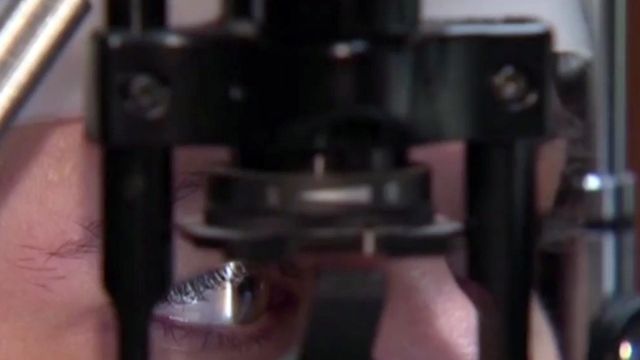Eye docs push back on NC surgery bill
North Carolina ophthalmologists say a proposal to allow optometrists to perform some types of eye surgery would jeopardize patient safety. But optometrists say eye doctors are inflating the risk.
Posted — UpdatedDuring a Tuesday news conference, Rep. Greg Murphy, R-Pitt, a practicing surgeon and urologist in Greenville, talked about his five years of surgical training.
"This would allow folks that have no prior in-depth surgical training to perform surgery," Murphy said. "We ought to keep surgery for surgeons. The optometrists do a fantastic job at what they do. We're not criticizing that whatsoever. But in my opinion, and also of the North Carolina Medical Society, we ought to allow surgeons to do surgery."
"That shows a definite statistical quality metric that shows that the quality of care resides with ophthalmologists in these particular and not with optometrists," Murphy said. "That's data, that's verifiable, and it's something I believe that we can make decisions on."
"There have been problems," said Dr. Cynthia Bradford, the president of the American Academy of Ophthalmology, who practices in Oklahoma. "These are life-threatening diseases. Melanomas on the eyelid that they thought was a backed-up oil gland that needed to be drained because they didn't get the diagnosis right."
Dr. Susan Burden, an ophthalmology professor at the Wake Forest School of Medicine, said there's no way to know whether a lesion or growth on the eyelid is benign without sending it to a pathologist. Other mistakes in laser surgery can cause bleeding inside the eye or other problems that can be difficult to remedy, she said.
"My concern is not only will this not be safe for patients but will increase the cost of care," Burden said.
Optometrists, on the other hand, say expanding their range of services will increase access to care for patients who need the procedures.
Adrianne Drollette is executive director of the North Carolina Optometric Society, a group that's lobbying in favor of House Bill 36.
"I think that optometrists here in North Carolina have a really strong history of providing excellent care to their patients," Drollette said, adding that, for the procedures North Carolina optometrists are asking to do, no patient complaints have been filed with the state boards of optometry in the three states that have allowed them.
Asked about the JAMA study that appears to show poorer patient outcomes for surgery by optometrists, Drollette called it "biased and flawed."
"That study was actually funded by the American Academy of Ophthalmology for the purpose of fighting back on optometry scope-of-practice expansion," she said. "Again, there have been no quality-of-care issues on any of these procedures that we're looking to do.
"Optometrists aren't starting from scratch on this. They learn how to treat glaucoma and all of these diseases in optometry school. They treat glaucoma in their practices every day. They do pre- and post-op care for all these procedures, for cataract surgery," Drollette said. "Students that are in optometry school today are learning how to do these procedures, so they're coming out of school already trained and prepared to do them on Day One."
The measure is currently in the House Health Committee, where it's received one hearing, but no vote yet.
Related Topics
• Credits
Copyright 2024 by Capitol Broadcasting Company. All rights reserved. This material may not be published, broadcast, rewritten or redistributed.





